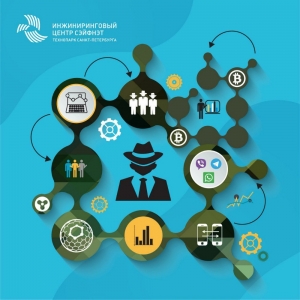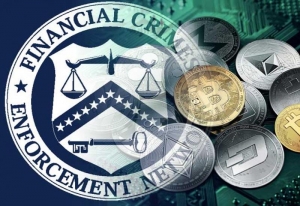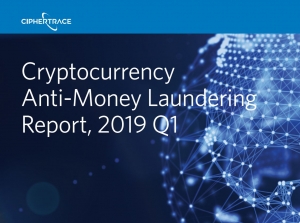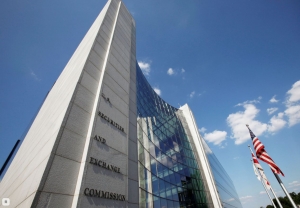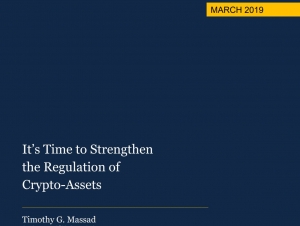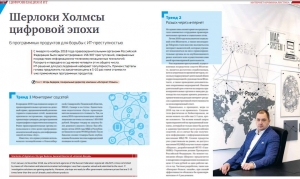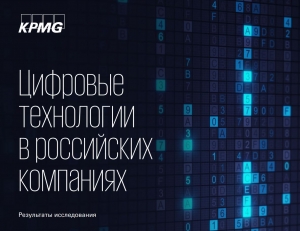CYBERPOL PUBLIC SEARCH CRIMINAL DATABASE TO INCLUDE CRYPTOCURRENCY WALLETS USED IN CYBERCRIME
BRUSSELS, 1000, BELGIUM, June 18, 2019. CYBERPOL Public Search Criminal Database to include Crypto Currency wallets used in cyber crime.
CYBERPOL The International Cyber Policing Organization established by decree no WL 22/16.595 established today four years ago in Brussels made available to the public the first cyber criminal database empowered by the "Neural symbiotic network of the super computer" as the international cyber utility agency leader in investigation in cyber crimes and terror of the Dark-Web today.
This first Cyber Criminal Public Record Database in Beta Test mode currently will allow four basic levels of searching of wanted cyber criminals allowing for verification and searches of IP's, emails and Cryptocurrency wallets used in on-line scams related to cyber crimes listed in the database.
In addition to this, all cryptowallets using crypto currencies in cybercrime will now be listed on the Cyber Crime search engine by CYBERPOL organization making it very difficult for cyber criminals to use crypto-currencies as payment methods for scams and cyber crimes.
You can now report any scam email to CYBERPOL that when verified will be listed in the CYBERPOL Cyber Criminal Public Database open to public to search.
More than £108,000 in bitcoin was paid by victims of the WannaCry ransomware attacks using bitcoin as undetectable crypto-currency payment. Since such wallets used in crimes are not considered privacy breaches but in the interest of the law it is in the public interest to warn public and make such wallets black listed public records globally before further victims falls pray to cyber crimes Baretzky President of CYBERPOL said.
Public and law enforcement can use this CYBERPOL facilities for free and report such e-mail of extortion to be entered into the public records of CYBERPOL Public Utility directly by requests.
Several entries is already public to search on-line and don't try to fool CYBERPOL. The tracking of cyber crimes goes the extra mile to track the same hackers when visiting the search engine on CYBERPOL website using a new AI (Artificial Intelligence) named 666 to capture both mac and serial number of such computers. Don't be a hackers fool to search yourselves if you are already involved in cyber crimes, the CYBERPOL Spokes Person warned.
This will be a huge blow for crypto currencies and wallets used in cyber crimes and scams as the wallet numbers will be public listed and open to see to all public and law-enforcement free of charges in disrupting cyber crimes.
The message is clear and simple President Ricardo Baretzky of CYBERPOL said "Don't use any Crypto Currencies in INTERNET crimes as we will not only find you but list your crypto WALLET accounts for good in the block-chain based search engine of CYBERPOL Supper Computer AI 666 symbiotic neural network and let me assure all those financial criminals, once listed there is no escape! I hope this message is clear to criminals and corruption".
It seems the days messing with elections using secret corruption payments could be counted as CYBERPOL has set a new paradigm in combating cyber crimes and global corruption never seen before...
Source: EIN Presswire.
ANNOUNCED THE CREATION OF A SPECIAL ELABORATIONS DEPARTMENT
In early July, SafeNet regional engineering center (structural division of JSC Technopark of St. Petersburg) has introduced a new project.
Thus, together with the company Internet-Rozysk was announced the creation of the Special elaborations department. Which purpose is the organization of work with information and analytical and other products intended for the prevention, suppression and investigation of the offenses committed by means of information and telecommunication technologies.
Key activities of the new Department:
1. interaction with profile startups, companies and developers;
2. organization of interaction with state and law enforcement agencies. Control over the legality and legality of the development;
3. consulting and carrying out examinations, development of methodical and scientific base, training and professional development for the persons engaged in law enforcement activity, and also other persons;
4. organization of demonstration zones, exhibitions, interaction with the media, negotiations aimed at attracting interest in the development of the Department, the implementation of its product line, promotion of activities.
Developers engaged in the following project categories are invited to interact:
- assessment of reliability of contractors and staff;
- non-instrumental lie detection;
- detection of illegal activities in social networks;
- analysis and tracking of cryptocurrency transactions;
- establishing users phone numbers and email addresses;
- establishing users of secure messengers;
- enrichment and analysis of large amounts of publicly available data;
- detection and suppression of confidential information leaks;
- darknet Analytics;
- analysis and decoding of Internet traffic.
Source: SafeNet еngineering center.
APPLICATION OF FINCEN’S REGULATIONS TO CERTAIN BUSINESS MODELS INVOLVING CONVERTIBLE VIRTUAL CURRENCIES
On May 9, 2019, FinCEN released guidelines for applying the rules to some of the Business Models for Attracting Convertible Virtual Currencies. To remind individuals under the Banking Secrets Act (BSA) about how FinCEN rules relating to companies providing monetary services (MSBs) apply to certain business models related to the transfer of money denominated in value, which replaces currency, in particular, convertible virtual currencies (CVCs).
This guidance does not establish any new regulatory expectations or requirements. Rather, it consolidates current FinCEN regulations, and related administrative rulings and guidance issued since 2011, and then applies these rules and interpretations to other common business models involving CVC engaging in the same underlying patterns of activity.
This guidance is intended to help financial institutions comply with their existing obligations under the BSA as they relate to current and emerging business models involving CVC by describing FinCEN’s existing regulatory approach to the issues most frequently raised by industry, law enforcement, and other regulatory bodies within this evolving financial environment. In this regard, it covers only certain business models and necessarily does not address every potential combination of facts and circumstances. Thus, a person working with a business model not specifically included in this guidance may still have BSA obligations.
The overall structure of this guidance is as follows:
Section 1 defines certain key concepts within the context of the guidance. Although the titles or names assigned to these key concepts may coincide with terms customarily used by industry and share similar attributes, for purposes of the guidance their meaning is limited to the definition provided in the guidance.
Section 2 consolidates and explains current FinCEN regulations, previous administrative rulings, and guidance involving the regulation of money transmission under the BSA. By consolidating and summarizing rules and interpretation in a single Section, this guidance provides a resource to help financial institutions comply with their existing obligations under the BSA as they relate to current and emerging activities involving CVC.
Section 3 summarizes the development and content of FinCEN’s 2013 guidance on the application of money transmission regulations to transactions denominated in CVC.
Sections 4 and 5 describe FinCEN’s existing regulatory approach to current and emerging business models using patterns of activity involving CVC. This approach illustrates how FinCEN fits existing interpretations about certain activities to other activities that at first may seem unrelated, but conform to the same combination of key facts and circumstances.
Finally, Section 6 contains a list of resources to which interested parties may refer for further explanation about the content of the guidance, or to assist in evaluating facts and circumstances not expressly covered in this guidance.
Source: United States Department of the Treasury Financial Crimes Enforcement Network | FinCEN.gov
CRYPTOCURRENCY ANTI-MONEY LAUNDERING REPORT - Q1 2019
Report for the first three months of the current year CipherTrace Cryptocurrency Intelligence (April 2019).
Cryptocurrency Thefts, Scams, and Fraud Could Tally More than $1.2 Billion in First Quarter 2019.
Criminals stole more than US$356 million from exchanges and infrastructure during the first quarter of 2019. Among these losses, exit scams—which CipherTrace is considering the implosion of QuadrigaCX to be one—robbed cryptocurrency users of nearly US$195 million. On top of these numbers, the New York Attorney General’s Office revealed what they allege is a fraud involving the loss of $851 million by a major cryptocurrency exchange, Bitfinex. Cyber criminals also developed ingenious new techniques to drain millions more from user accounts and wallets. These thefts only represent the losses that are visible. CipherTrace estimates the true number of crypto asset losses was much higher.
46% Increase in the Number of Cross-Border Payments from US Cryptocurrency Exchanges Over the Last Two Years.
CipherTrace research conducted in Q1 revealed a major hole in the current cryptocurrency regulatory fabric with respect to cross-border payments. An analysis of 164 million BTC transactions revealed that cross-border payments from US exchanges to offshore exchanges increased from 45% from the twelve months ending Q1 2017 to 66% in the twelve months ending Q1 2019. This is significant because according to the International Consortium of Investigative Journalists, “$8.7 trillion, 11.5 percent of the world’s wealth, is hidden offshore.”
Once these payments reach exchanges and wallets in other parts of the globe they fall off the radar of US authorities. For now, it is uncertain if these cross border inter-exchange payments trigger the FinCEN requirement that “MSBs must keep a five-year record of currency exchanges greater than $1,000 and money transfers greater than $3,000.” But experts recommend MSBs retain tax ID/SSN for these transactions.
A Significant Wave of Regulation Is Coming to the Cryptocurrency Economy.
Ultimately, thieves and scam artists will need to launder the cryptocurrency stolen or scammed in Q1 2019. Furthermore, this will require innovative new ways to cash out, and turn all that tainted virtual money into clean, spendable fiat currencies. And they will also need to get it done under the much more watchful eyes of government regulators and banks as a tsunami of tough new global anti-money laundering (AML) and counter-terror financing (CTF) regulations will roll over the crypto landscape in the coming year. As of April 2019, 17 countries plus the European Union within the jurisdiction of the Financial Stability Board had at least some regulation or standard-setting bodies dealing with cryptocurrencies. These bodies will be responsible for implementing regulations that enforce FATF policy and AMLD5.
In light of the huge losses suffered by users of QuadrigaCX, regulators in Canada and around the world are rethinking controls on the internal business practices and security operations of exchanges. In addition, regulators are beginning to recommend bans on privacy coins, as criminals are coming to prefer these new anonymous altcoins to bitcoin because they are more difficult to trace. Banks also continue to face problems coping with the coming wave of regulations as they increasingly recognize there are undetected cryptocurrency operations that are using their fiat payment networks and customer accounts. Plus, courts in some countries have ruled that banks must do business with licensed cryptocurrency companies.
Crypto Crime Evolves and Expands from the Virtual to the Real World.
The previous year’s crypto crime spree was dominated by major external exchange hacks around the globe—with the biggest occurring in Q1 2018. However, in the first quarter of this year, insiders, extortionists and scammers attempted a more diverse range of crypto crimes. As just one example, kidnappers in Norway demanded nine million euros (approximately US$10.3 million) ransom in Monero, a privacy coin, for a billionaire’s wife, who has not yet been returned. There were also two large insider thefts/misappropriations (QuadrigaCX and Bitfinex). This shift suggests that security against external hackers at exchanges is maturing under the pressure from regulators and customers to take necessary measures to prevent losses.
The geopolitical implications of cryptocurrencies also took center stage in Q1 2019 with countries competing to attract crypto businesses and foster related economic growth. Conversely, overt attempts to evade sanctions by hostile nations show that economic adversaries recognize the money laundering and terrorist financing potential of crypto assets. On March 6, 2019, the UN Security Council reported North Korean state-backed hackers successfully breached at least five cryptocurrency exchanges in Asia between January 2017 and September 2018, causing $571 million in losses.
Q1 2019 Crypto Crime Highlights:
- Thieves and scammers stole more than $356 million from exchanges and users.
- Customers suffered losses of approximately US$195 million when Canada’s major cryptocurrency exchange, QuadrigaCX, imploded after the CEO mysteriously perished in India, allegedly along with the passwords to virtually all of the exchange’s assets. CipherTrace analysis casts severe doubt that this was anything other than a theft, fraud, or foul play.
- On March 26, the New York Attorney General’s Office brought suit against the parent company of Bitfinex and Tether.
- The AG claimed Tether had failed to disclose a secret transfer of funds from the fiat pool of funds supposedly backing tether, which converted tether from asset-backed to debt-backed unbeknownst to tether holders.
- Bitfinex allegedly lost $851 million. The source of the loss was a Panamanian payment processor also used by QuadrigaCX.
- Iran announced the imminent launch of its long-rumored Crypto Rial, a state-backed stable coin developed with the express purpose of circumventing political sanctions and overcoming sanctions-related restrictions by SWIFT.
- The Russian Duma approved international use of the domestically developed SPFS as a ‘SWIFT alternative’ for cross-border payments in an effort to avoid political sanctions.
- The French government issued a report recommending a ban on privacy coins.
- The UN published the findings of a private report that concluded North Korean hackers looted $571 million from five cryptocurrency exchanges in Asia.
- Courts in some countries forced financial institutions to bank crypto asset businesses.
- The Bank of Mexico reportedly proposed banning financial institutions from transacting with crypto exchanges, citing money laundering and terror financing risks.
Source: CipherTrace.
SMART CONTRACTS IN FINANCIAL SERVICES: GETTING FROM HYPE TO REALITY
Report of 2016, by Capgemini Consulting’s Digital Transformation Institute, documents what named executives at leading financial institutions are saying about the potential of ‘smart contracts,’ which differ from standard contracts in that they are electronically programmed and based on distributed ledgers such as blockchain technology.
They enable financial firms to automatically enforce actions like payments without the need for independent verification or manual processing. The report predicts mainstream adoption of smart contracts will begin in 2020 and save consumers over $500 in fees...
Source: Capgemini: Consulting, Technology, Digital Transformation Services.
IMPORTANT APPROACHES TO THE ORGANIZATION OF WORK ON IMPLEMENTATION OF AML/CFT LEGISLATION REQUIREMENTS
On March 27, 2019, training for students of the 7th stream of the BCL (Blockchain Lawyers) supplementary education program was completed at the Federation Council.
As part of that, the audience in a round table format along with the first deputy chairman of the Federation Council Committee on Economic Policy, the founders and teachers of the course, as well as invited experts discussed the regulation of the digital economy and modern technologies in Russia.
Natalya Manuilova paid special attention to the following issues: that the Bank of Russia had several new and important documents aimed at fulfilling the requirements of the legislation in the area of countering the legalization (laundering) of proceeds from crime and the financing of terrorism (AML/CFT). Important on the approach to the organization of work in this direction.
Thus, one of these documents is Directive No. 5083-U of 02/27/2019 “On Amendments to the Regulation of the Bank of Russia of March 2, 2012 No. 375-P“ On the Requirements for the Rules of Internal Control of a Credit Organization to Counter Legalization (Money Laundering) criminal proceeds and the financing of terrorism. ” In accordance with the changes that will come into force on 04/05/2019, the ML/TF risk management systems in credit institutions will have to take into account the results of a national risk assessment of transactions (transactions) in order to legalize (launder) proceeds from crime, and the financing of terrorism, posted on the official website of the authorized body on the Internet information and telecommunications network.
The possibility for credit institutions to install in the Risk Management Programs “other factors independently determined by the credit organization” scares many, but these factors must be fixed, fixed in the Rules of the credit organization. And no one has canceled a systematic approach - why are some requirements for some, and others for others? “Documentary fixation” will compel to substantiate certain AML/CFT measures.
In accordance with the Bank of Russia Newsletter No. IN-014-12/27 of 03/27/2019 “On Approaches to the Procedure for the Implementation of Credit Rights by Credit Institutions Provided by Sub-clause 1.1 of Clause 1 of Article 7 of Federal Law No. 115 “On Counteracting Legalization (Laundering) of Revenues criminal proceeds and the financing of terrorism” the Bank of Russia draws the attention of credit institutions to the need to follow the results of their assessment of the extent (level) of the risk of a client’s operations for AML/FT when implementing these powers in accordance with its own rules of internal control in order to counter the legalization (laundering) of proceeds from crime and the financing of terrorism.
Will high-risk transactions (deals) with digital assets be added to the list? Definitely! Companies need to start preparing letter templates - explanations about the sources of funds received to the account, etc.
The Bank of Russia still had to pay attention to the not quite adequate measures of credit institutions regarding blocking accounts under federal law 115, inquiries about the source of clients funds, whose operations in principle do not bear and cannot bear the risks of ML/FT and the risk of involvement credit organization in the scheme of ML/FT.
Let's hope for positive changes, because for a long time, the “struggle” of a number of banks on AML/CFT issues has discredited the AML/CFT system as a whole, and only the one who has not come to the bank does not care about 115-FL.
At the same time, the information letter of Rosfinmonitoring dated March 1, 2019 No. 59 “On Methodological Recommendations for Assessing ML/TF Risks by Organizations that Operate with Monetary Funds or Other Property and individual entrepreneur” was discussed.
From which it was seen that there are three types of risks:
- risks associated with countries and individual geographic territories (country risks);
- customer related risks (customer risks);
- risks associated with products, services, operations (transactions) or supply chains made by the customer (operational risks), a high level for operations with digital assets.
SEC STATEMENT ON “FRAMEWORK FOR INVESTMENT CONTRACT ANALYSIS OF DIGITAL ASSETS”
April 3, 2019. Public Statement. Bill Hinman, Director of Division of Corporation Finance; Valerie Szczepanik, Senior Advisor for Digital Assets and Innovation.
Blockchain and distributed ledger technology can catalyze a wide range of innovation. They have seen these technologies used to create financial instruments, sometimes in the form of tokens or coins that can provide investment opportunities like those offered through more traditional forms of securities. Depending on the nature of the digital asset, including what rights it purports to convey and how it is offered and sold, it may fall within the definition of a security under the U.S. federal securities laws.
As part of a continuing effort to assist those seeking to comply with the U.S. federal securities laws, FinHub is publishing a framework for analyzing whether a digital asset is offered and sold as an investment contract, and, therefore, is a security. The framework is not intended to be an exhaustive overview of the law, but rather, an analytical tool to help market participants assess whether the federal securities laws apply to the offer, sale, or resale of a particular digital asset. Also, the Division of Corporation Finance is issuing a response to a no-action request, indicating that the Division will not recommend enforcement action to the Commission if the digital asset described in the request is offered or sold without registration under the U.S. federal securities laws.
This framework represents Staff views and is not a rule, regulation, or statement of the Commission. The Commission has neither approved nor disapproved its content. This framework, like other Staff guidance, is not binding on the Divisions or the Commission. It does not constitute legal advice, for which you should consult with your own attorney. It does not modify or replace any existing applicable laws, regulations, or rules. Market participants are encouraged to review all the materials published on FinHub...
Source: SEC.gov
IT’S TIME TO STRENGTHEN THE REGULATION OF CRYPTO-ASSETS
There is a gap in the regulation of crypto-assets that Congress needs to fix. The gap is contributing to fraud and weak investor protection in the distribution and trading of crypto-assets. In “It’s time to strengthen the regulation of crypto-assets,” Timothy G. Massad discusses how better regulation will benefit crypto investors, further the development of new technologies, curtail the use of crypto-assets used for illicit payments, and reduce the risk of cyber attacks, which can result in collateral damage elsewhere in our financial system.
Crypto-assets cut across current jurisdictional boundaries and thus fall into gaps between regulatory authorities. While each of the Securities and Exchange Commission (SEC) and the Commodity Futures Trading Commission (CFTC) has some authority over crypto-assets, neither has sufficient jurisdiction, nor do they together.
The hype surrounding Bitcoin and other crypto-assets has contributed to regulatory distraction. Bitcoin’s creators promised it would solve the “trust problem” and reduce our reliance on centralized financial intermediaries. However, it has not reduced our reliance on financial intermediaries or eroded the power of our largest institutions. Indeed, crypto-assets have created new financial intermediaries that are less accountable than the big banks.
New crypto exchanges and trading platforms are not subject to the traditional standards required of securities and derivatives market intermediaries. As a result, investor protection is weak and allegations of fraud and conflicts of interest are frequent.
There are no specific rules to ensure protection of customer assets. One supposed virtue of distributed ledger technology (DLT) is to provide an immutable record of ownership. Yet some platforms do not actually record customer interests on the blockchain and may operate without sufficient assets to cover customer claims. It is like fractional reserve banking without the regulatory framework or insurance that protects depositors. There are no rules regarding how trades are executed.
Crypto exchanges are not required to have systems to prevent fraud and manipulation, nor are there rules to prevent or minimize conflicts of interest. Crypto exchanges can engage in proprietary trading against their customers, something the New York Stock Exchange cannot do. Regulations to minimize operational risk and ensure system safeguards are needed, just as with securities and derivatives intermediaries.
Inadequate regulatory oversight creates broader societal risks with respect to cyber security and illicit payments. Unlike banks and exchanges, crypto intermediaries do not face any specific cyber security requirements, and cyber hacks are common: “Hacking [against crypto institutions] is on the rise because it works.”
Source: The Brookings Institution.
SHERLOCK HOLMES OF THE DIGITAL ERA: TRENDS AND DEVELOPMENT VECTOR OF INFORMATION AND ANALYTICAL SERVICES
In a special March issue of RUBEZH magazine, the founder Internet-Rozysk, Igor Bederov told about six main trends and products that will determine the vector of development of information and analytical services developed for law enforcement agencies and private security services.
From January to November 2018, law enforcement agencies of the Russian Federation registered 156,307 crimes committed by means of information and telecommunication technologies. Less than a quarter solved and submitted to the court. IT investigative solutions are gaining popularity. Moreover, startups are ready to offer government customers prices that are 5-10 times lower than the cost of already used software products.
For example, trend 6: Control cryptocurrency turnover
Along with the growing popularity of cryptocurrency operations in the world, their appeal to criminals is also increasing. In August 2018, the Federal Financial Monitoring Service Rosfinmonitoring), whose task is to counter financial frauds and the financing of terrorism, ordered an analytical tool to track operations with cryptocurrencies, in particular Bitcoin.
According to information from the state procurement website, by the end of 2018, the system should have a mechanism for receiving and processing information about transactions in bitcoins and electronic wallets. A government contract worth 196 million rubles for the development of the platform was obtained by the Institute for Security Problems and Information Analysis (SPI).
A similar product designed for assessing the reliability of cryptowallets and conducting investigations of crimes committed using cryptocurrencies is being developed in St. Petersburg.
The project is actively seeking investors. It has the working title “SICP” (Security Intelligence Cryptocurrencies Platform). At the time of writing, the SICP is the only working domestic service for evaluating cryptotransactions. The free alpha version of the service is shared on the link: http://sicp.ueba.su
Source: RuBezh.
DIGITAL TECHNOLOGIES IN RUSSIAN COMPANIES
At the beginning of the year, KPMG surveyed more than 100 of the largest companies and found out which technologies the Russian business is implementing, which budgets of the organization are willing to spend on such projects and how they generally approach the management of digital transformation.
Main conclusions:
63% of respondents indicated that they have developed a digital transformation program, but in reality this more often means a set of short-term pilot projects;
77% of responding companies expect increased operational efficiency and reduced costs through digitization of processes;
The most popular technologies that have already been tested by Russian companies: big data analysis and predictive analytics (68%), chat bots (51%), robotization of office processes (50%);
The position of the CDO (Chief Digital Officer) is only in 16% of companies, the committee on digitalization - in 13%. In most Russian companies, decisions on digitalization projects are made by individual consideration at the top management level;
65% of companies attract startups to implement pilot projects;
In 2019, 36% of companies are ready to invest more than 100 million rubles in the implementation of projects on digitization of processes, while 55% of respondents plan to spend less than 50 million rubles;
51% of companies expect that the investment will pay off in less than 2 years, another 43% expect return on investment within 2-5 years.
Source: KPMG | RU.
О КОСАтка
Корпоративная система аналитики Транзакция Криптовалюта Актив - кибербезопасность инфраструктуры блокчейнов и антифрод в криптовалютной сфере (антискам, прозрачность, комплаенс).
Связаться
Российская Федерация, Москва
Тел.: +7 (911) 999 9868
Факс:
Почта: cosatca@ueba.su
Сайт: www.ueba.su



